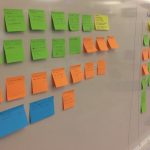The power of routine – which is best for your creativity?
I recently had a fellow professional on LinkedIn ask me this question “what would you say is the best preparation/routine in the morning in order to have a creative day? What are your thoughts on the power of routine?“.
By the time I finished typing the response I realised that I really should be sharing the wealth.
Routine works wonders in numerous areas of our lives. In some instances, a certain “kind and type” of exact routine can work for more than one person. For example;
Overall physical fitness – without routine those cross-training individuals who pursued the title of “The Fittest Man/Woman on Earth” clearly wouldn’t be the fittest people on earth.
Professional sports – there are too many classifications and types of sports to mention here, but it’s a no-brainer. Ali, Ayrton Senna, Jim Brown, Michael Jordan, Usain Bolt were not regarded as the greatest in their respective sports for not having a routine (some arguably – but that is not the point).
The mind – the exercise of the mind is just as, no, actually it is more important than the exercise of the body.
Routine for the creative mind
Having structure is very important, this is go without saying. Consider the quote:
“Be regular and ordinary in your life, so that you may be violent and original in your work”
Gustave Flaubert
The word’s of the above literarian rang true for many famous musicians such as Mozart, Hugo, Strauss and more. They all had a routine, and understood that routine and creativity had a symbiotic relationship.
There is a inter-dependance between the two.
The above is a telling statement. However, I don’t believe that there is any “one best routine” when it comes to creativity. After all, people are different, therefore think differently and are motivated by different things. I not a believer in carbon copying step for step another persons early morning routine, because then I am attempting to simply be that individual when I know I am not…I am me.
Routines that I have seen generally bring the most consistent success are ones where some exertion of energy is involved, contemplation/meditation and visualisation. And it’s really has to be unique to what you would consider a mundane task in your day.
These to me are the most important components of a routine in my experience. It’s important to know where you have been/what you have done to understand and visualise where you want to go and want to next achieve.
I work in the speciality of UX Design. My routine – which has helped to create relative success in the world of UX – helped to create an opportunity to give back to charities that I am extremely passionate about.
So I decided to commit to spending several months doing just that in Central America in late 2017. Go where I was helped to understand there was a greater need. I still maintained a routine that worked for me, even whilst I volunteered full-time for over 3 months. I continue to maintain a routine today.
So I personally admire and am inspired in part by many of the successful people I’ve met, or read about that have routines and work hard to maintain my own which helps to keep me focused.
In short, my answer to that fellow LinkedIn professional and advice to anyone reading this was and is; There is “no one best routine” for creativity. Find our own routine, don’t simply copy others from their blog or social media channel. But incorporate, adapt but don’t carbon copy.
After all, it is our individualism that makes us unique.
The power of routine – good habits
When you find a routine that works for you, stick to it for at least 90 days before you start to make adjustments. It has been said that 30 days are what most people need to create a habit, but 90 days of that habit provides enough time to see results.
There are many routines and articles out there. Some more specific to design some not.
Just remember, carbon copying is shortchanging yourself on recognising the amazing individual you potentially “can be”.


